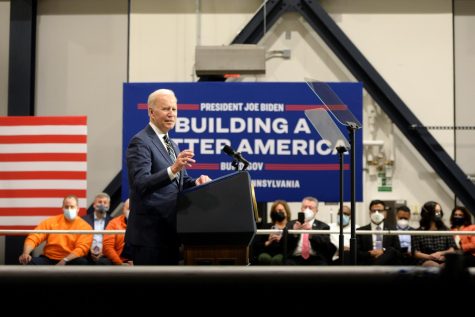Corbett signs state budget that preserves Pitt funding
June 30, 2012
Pitt can breathe a little easier this upcoming year.
Gov. Tom Corbett signed the state budget… Pitt can breathe a little easier this upcoming year.
Gov. Tom Corbett signed the $27.66 billion state budget for the 2012-2013 fiscal year into law late on June 30 without a cut in funding to the state-related universities.
Corbett signed the budget before the deadline for the end of the 2011-2012 fiscal year after a busy Saturday session at which state lawmakers scrambled past 11 p.m. debating certain aspects of the coming fiscal year’s spending plan.
The Pitt funding bill passed the state House on a 184-12 vote before passing the state Senate. Penn State’s funding also passed the house on a 177-19 vote before going to the Senate.
Sen. Mike Stack, D-Philadelphia, said during the Senate debate that while he supports funding higher education, he was “troubled” by the lack of transparency from universities in how they spend their money. He specifically addressed the Jerry Sandusky scandal that plagued Penn State as an example of a lack of transparency and said he wished that the state could have made universities disclose how they spend taxpayer money this year.
Corbett signed the budget in the Capitol rotunda at 11:45 p.m., minutes before the deadline. Last year’s signing took place at 11:47 p.m. on the last night of the fiscal year.
But financial decisions are not completely settled yet regarding tuition.
Pitt spokesman John Fedele said that nothing will be decided on tuition until the budget committee and the executive committee of the Board of Trustees meet on July 13.
Penn State President Rodney Erickson pledged to not increase tuition for students more than the level of inflation based upon last year’s Consumer Price Index, which will be a 2.9 percent tuition increase for Pennsylvania resident students at the main campus and a 1.9 increase at the branch campuses. Penn State’s next Board of Trustees meeting will take place next week.
The day before Corbett signed the budget, Temple University’s Board of Trustees voted to hold the line on tuition for the next school year.
Corbett said at the signing ceremony that he was pleased to sign another new budget on time and without imposing taxes.
House Majority Leader Mike Turzai, R-Bradford Woods, followed up Corbett’s comments by saying that the governor’s administration “has had the most fiscally responsible administration we have seen in our lifetimes” and it has been focused on “getting the most out of public education, higher education and public welfare.”
Pitt’s funding will remain the same as in the 2011-2012 fiscal year, with $136 million allocated to the University from the state. The governor, whose party holds a majority in both the House and Senate, originally proposed a 30 percent reduction to three of the four state-related Universities — Pitt, Penn State and Temple — and leaving funding for Lincoln, by far the smallest state-related university, untouched.
But Corbett’s plan met with resistance from members of his own party throughout the process. Eventually, the state House and Senate passed a $27.6 billion budget that flat-funded higher-education and public schools while cutting funding for welfare by 10 percent.
Although normally, given inflation, flat funding might not be a cause for celebration, this budget decision comes as good news to the University, considering the 30 percent cut Corbett originally proposed, as well as last year’s 19 percent cut to Pitt’s funding. In 2011, Corbett proposed a 50 percent cut to Pitt’s state funding.
The second year of proposed cuts sparked conversation on campus that had once seemed inconceivable. Chancellor Mark Nordenberg and other members of Pitt’s administration publicly discussed the possibility that Pitt might become a private institution, despite its being state-related since 1966.
Once the ink had begun to dry, the University reacted positively to the news that Pitt did not receive a cut.
Fedele said in an email that the University was “grateful” to the politicians in Harrisburg for keeping funding at the same level as last year.
“Legislators heard from many members of the Pitt community; alumni, parents and students, and their action is recognition of the importance of strong research universities that serve Pennsylvania’s best and brightest students and are a huge engine of economic growth and stability for the region,” he said.
Robert Beecher, chairman of Student Government Board’s Governmental Relations Committee, was also pleased with the outcome.
“We’re ecstatic that Pitt isn’t going to be receiving another cut this year,” he said.
Beecher specifically cited Sen. Jake Corman, R-Centre, who is the leading Republican on the Senate Appropriations Committee, for seeing “the value in funding higher education.” Corman broke with the governor as early as February to voice his support for funding higher education.
Beecher also praised the efforts of students who took part in advocacy efforts on Pitt’s behalf.
“If it weren’t for the efforts of everyday students, who took time out of their day to go to Harrisburg or personally write letters to their representatives, I don’t think we would be having this conversation,” he said.
Editor’s note: This article was updated on July 3, 2012







